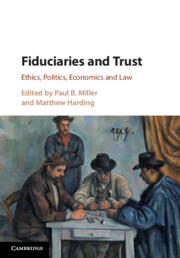Book contents
- Fiduciaries and Trust
- Fiduciaries and Trust
- Copyright page
- Dedication
- Contents
- Contributors
- Acknowledgements
- Introduction
- Part I Personal Trust and Fiduciary Relationships
- 1 Fiduciary Grounds and Reasons
- 2 Trust and Advice
- 3 Contracts, Fiduciary Relationships and Trust
- 4 Trust, Autonomy and the Fiduciary Relationship
- 5 The Psychology of Trust and Fiduciary Obligations
- Part II Personal Trust and Fiduciary Duties
- Part III Political Trust and Fiduciary Government
- Part IV Trust and Fiduciary Law in Context
- Index
2 - Trust and Advice
from Part I - Personal Trust and Fiduciary Relationships
Published online by Cambridge University Press: 13 March 2020
- Fiduciaries and Trust
- Fiduciaries and Trust
- Copyright page
- Dedication
- Contents
- Contributors
- Acknowledgements
- Introduction
- Part I Personal Trust and Fiduciary Relationships
- 1 Fiduciary Grounds and Reasons
- 2 Trust and Advice
- 3 Contracts, Fiduciary Relationships and Trust
- 4 Trust, Autonomy and the Fiduciary Relationship
- 5 The Psychology of Trust and Fiduciary Obligations
- Part II Personal Trust and Fiduciary Duties
- Part III Political Trust and Fiduciary Government
- Part IV Trust and Fiduciary Law in Context
- Index
Summary
Trust matters to fiduciary law in a variety of ways. This chapter will focus on the importance of trust in advisory relationships, and it will emphasize two settings: categorical fiduciary relationships and ad hoc fiduciary relationships. In the former setting, I will suggest that these relationships are appropriately treated as fiduciary in part due to the likelihood of a beneficiary’s epistemic dependence on a fiduciary’s judgements. It is not necessary for epistemic dependence to exist in any particular advisory relationship to support this categorical treatment, so long as the likelihood of epistemic dependence is high enough across the category. In turn, the presence of trust supports the likelihood of that epistemic dependence. In the ad hoc fiduciary setting, I will suggest that these relationships are sometimes best seen as a kind of “involvement” (as that concept is developed in David Owens’s work). Involvements are voluntary relationships even though they may have no precise moment when they come into existence. Importantly, the existence of involvements is generally recognizable by the parties involved. Trust is relevant here as an aid in legally identifying such relationships.
- Type
- Chapter
- Information
- Fiduciaries and TrustEthics, Politics, Economics and Law, pp. 35 - 54Publisher: Cambridge University PressPrint publication year: 2020
- 1
- Cited by

